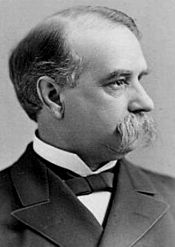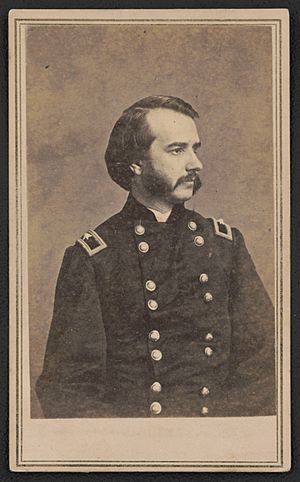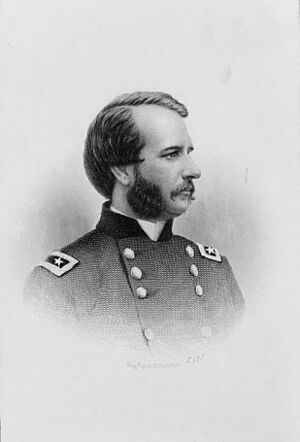John Franklin Miller (senator) facts for kids
Quick facts for kids
John Franklin Miller
|
|
|---|---|
 |
|
| United States Senator from California |
|
| In office March 4, 1881 – March 8, 1886 |
|
| Preceded by | Newton Booth |
| Succeeded by | George Hearst |
| Personal details | |
| Born | November 21, 1831 South Bend, Indiana |
| Died | March 8, 1886 (aged 54) Washington, D.C. |
| Nationality | American |
| Political party | Republican |
| Signature | |
| Military service | |
| Allegiance | United States of America Union |
| Branch/service | United States Army Union Army |
| Rank | |
| Battles/wars | American Civil War |

John Franklin Miller (born November 21, 1831 – died March 8, 1886) was an important figure in American history. He was a lawyer and a successful businessman. During the American Civil War, he served as a general in the Union Army. Later, he became a U.S. Senator for California, serving from 1881 until his death. As a senator, he supported laws that aimed to limit immigration from China.
Early Life and Beginnings
John Franklin Miller was born in South Bend, Indiana. Interestingly, his nephew, also named John Franklin Miller, later became a congressman for the state of Washington. To avoid confusion, both were sometimes known as John F. Miller.
John F. Miller received his education in South Bend, Chicago, and Ballston Spa, New York. He earned a law degree in 1852 from the New York State and National Law School. After becoming a lawyer, he started his own law practice in South Bend. The next year, he moved to Napa, California, where he continued his law career and also became the county treasurer. In 1855, he returned to South Bend and resumed his law practice. In 1860, Miller was elected to the Indiana State Senate.
Serving in the Civil War
When the Civil War began, John F. Miller joined the Union Army. On August 27, 1861, he was made a Colonel of the 29th Indiana Infantry Regiment. After their training, his regiment joined Buell's Army of the Ohio and marched to Tennessee.
Miller fought in the Battle of Shiloh and the Siege of Corinth. He led his regiment through northern Alabama and Tennessee, and also chased Braxton Bragg through Kentucky. During the Battle of Stones River in December 1862, Miller commanded a group of soldiers. On the second day of this battle, he led a strong counterattack across the Stones River. This attack pushed back the Confederate forces, but Miller was wounded in the neck.
During the Tullahoma campaign, Miller was again severely wounded. He lost his left eye in a small fight at Liberty Gap on June 27, 1863. He was out of action for almost a year while he recovered. Miller was promoted to Brigadier General on April 10, 1864. In May 1864, he was given an administrative job, commanding the soldiers in Nashville, Tennessee. He returned to fighting in December, leading a large force at the Battle of Nashville. For his brave service in that battle, Miller received an honorary promotion to Major General on March 13, 1865.
Life After the War
After the war, Miller chose not to join the regular army. He left the Volunteers on September 29, 1865, and moved back to California. President Andrew Johnson appointed him as the collector of customs for the Port of San Francisco. He held this job until 1869.
Miller then focused on business. For 12 years, he was the President of the Alaska Commercial Company. This company was very important in the fur industry, especially in the Pribilof Islands, which the U.S. had recently acquired.
In 1869, Miller bought land that was part of Rancho Yajome in Napa Valley. At the time, this area was mostly wilderness. General Miller and his wife bought the land in several parts from different owners, including the United States government and the State of California. Today, the Silverado Country Club is located on this property.
Miller returned to politics from 1878 to 1879, serving in California's second state constitutional convention. In 1880, the California state legislature elected the Republican Miller as one of the state's two Senators. He was a strong supporter of several laws that aimed to limit the number of Chinese immigrants coming into the country and their influence.
He was the chairman of the Committee to Revise the Laws of the United States for the Forty-seventh Congress. He also served on the Committee on Foreign Relations for the Forty-ninth Congress.
Senator Miller passed away in Washington, D.C. while still serving in office. He was first buried in the Laurel Hill Cemetery in San Francisco. Later, on May 5, 1913, he was reburied in the Arlington National Cemetery. He rests there alongside his wife, Mary Wickerham (Chess) Miller, his daughter, and his son-in-law, Rear Admiral Richardson Clover.
 | Leon Lynch |
 | Milton P. Webster |
 | Ferdinand Smith |


